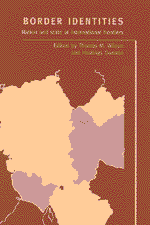Book contents
- Frontmatter
- Contents
- List of maps
- List of contributors
- Acknowledgements
- 1 Nation, state and identity at international borders
- 2 State formation and national identity in the Catalan borderlands during the eighteenth and nineteenth centuries
- 3 A western perspective on an eastern interpretation of where north meets south: Pyrenean borderland cultures
- 4 The ‘new immigration’ and the transformation of the European-African frontier
- 5 Transnationalism in California and Mexico at the end of empire
- 6 National identity on the frontier: Palestinians in the Israeli education system
- 7 Grenzregime (border regime): the Wall and its aftermath
- 8 Transcending the state? gender and borderline constructions of citizenship in Zimbabwe
- 9 Borders, boundaries, tradition and state on the Malaysian periphery
- 10 Markets, morality and modernity in north-east Turkey
- 11 Imagining ‘the South’: hybridity, heterotopias and Arabesk on the Turkish–Syrian border
- Author index
- Subject index
1 - Nation, state and identity at international borders
Published online by Cambridge University Press: 02 December 2009
- Frontmatter
- Contents
- List of maps
- List of contributors
- Acknowledgements
- 1 Nation, state and identity at international borders
- 2 State formation and national identity in the Catalan borderlands during the eighteenth and nineteenth centuries
- 3 A western perspective on an eastern interpretation of where north meets south: Pyrenean borderland cultures
- 4 The ‘new immigration’ and the transformation of the European-African frontier
- 5 Transnationalism in California and Mexico at the end of empire
- 6 National identity on the frontier: Palestinians in the Israeli education system
- 7 Grenzregime (border regime): the Wall and its aftermath
- 8 Transcending the state? gender and borderline constructions of citizenship in Zimbabwe
- 9 Borders, boundaries, tradition and state on the Malaysian periphery
- 10 Markets, morality and modernity in north-east Turkey
- 11 Imagining ‘the South’: hybridity, heterotopias and Arabesk on the Turkish–Syrian border
- Author index
- Subject index
Summary
According to some scholars, we are living in a world where state borders are increasingly obsolete. This view holds that international borders are becoming so porous that they no longer fulfil their historical role as barriers to the movement of goods, ideas and people, and as markers of the extent and power of the state. This withering away of the strength and importance of international borders is linked to the predicted demise of the nation-state as the pre-eminent political structure of modernity. The threatened passing of the state, in turn, heralds the weakening of most of the world's existing political, social and cultural structures and associations. As a result, the role of individuals in these structures is called into question, especially in terms of their loyalties and identities. In line with this fall-off in the determinative power of traditional political statuses is the rise of the new politics of identity, in which the definitions of citizenship, nation and state vie with identities which have acquired a new political significance, such as gender, sexuality, ethnicity and race, among others, for control of the popular and scholarly political imaginations of the contemporary world. Moreover, these processes are supposedly accelerating, continually shifting the ground upon which nation-states once stood, changing the framework of national and international politics, creating new and important categories of transnationalism, and increasing the significance and proliferation of images and a host of other messages about the relevance of ‘other’ world cultures in the everyday lives of us all.
- Type
- Chapter
- Information
- Border IdentitiesNation and State at International Frontiers, pp. 1 - 30Publisher: Cambridge University PressPrint publication year: 1998
- 81
- Cited by



